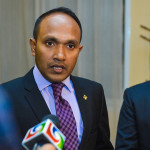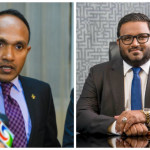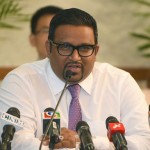The Vice President Waheed Deen has called for the country to prioritise a population consolidation plan to foster sustainable economic development in Maldives.
With a total population of nearly 350,000, dispersed over 196 inhabited islands spread over a distance of more than 600 miles, the Maldives is one of one of the world’s most dispersed countries. The extremely dispersed population and small island communities have been long recognised as key challenges to the sustainable social and economic development of Maldives.
“Without population consolidation we cannot achieve sustainable economic development,” Deen contended, speaking to the media first time since taking office, after parliament unanimously endorsed the resort tycoon as the Vice President on April 25.
Deen observed that islands with population below 400 still demand services such as sanitation, harbors, schools and hospitals, but the distribution of such social and economic services to the remote and least populated islands is an economic burden due the state to the high expenditures.
“So where is the economy of scale?” Deen asked. “If government continues to spend on small island populations, the expenditure will turn out to be a waste.”
According to the new VP, people need to understand that they can have access to be better services under a comprehensive sustainable economic model if they live together. He identified capital Male’, Hulhumale’ and Addu city as key examples of such development.
“Divide and Rule”
Meanwhile, the new Vice President also shared concerns over several obstacles to the resettlement of the people into larger populations.
“A policy of divide and rule has long existed among us and we need to move away from this,” said Deen, well known for his philanthropic works and praised as “the founding father of local government in the Maldives” for spearheading efforts to introduce local governance through elected councils, before resigning as Atolls Minister in August, 2008.
“Getting votes in smaller populations are easier. However, if the community grows larger, influencing or controlling the people will not be easy,” Deen explained. “So, this is a very important point people needs to think about.”
He noted that detailed discussions on the matter are yet to be had with the government, but the issue remains a top priority: “I envision that people of Maldives will live in 25 to 30 islands. Each island will be of twice that of Hulhumale’. Around 60,000 to 70,000 will live on each island. This a a dream I see. I will try to make this dream come true.”
Currently, around 130 islands have populations less than a 1000, and others between 1000-6000, while Male’ accounts for one third of the total population, where the density of the population is over 40,000 per square kilometer.
Failed initiative
Deen’s remarks today on population consolidation mark a renewed ambition to follow through on the much awaited population strategy that has been discussed for a quarter-century, but has fallen short of making any significant outcomes. The former MDP government – now replaced by a coalition of former opposition parties – had favoured connectivity and transportation, but stopped short of relocation.
Population consolidation plans originated in the 1980’s under the banner of ‘Selected Islands Development Project’. However, concerned by the inefficiency of distribution of social services and basic infrastructure in islands with small population, and counter in-migration towards capital Male’, President Maumoon Abdul Gayoom’s administration embarked on a revised resettlement program called the ‘National Population Consolidation Strategy and Programme’, published in 2001.
Under this proposed strategy, two regional growth centers were agreed to be created serving respectively the Northern and the Southern atolls. In addition, 85 focus islands were selected to receive a high order of services; the other inhabited islands, called primary islands would receive a minimum level of services and population would be encouraged through various forms of subsidies to move toward the focus islands and the regional centers
Resettlement of nearly 17 islands were reportedly under review during the Gayoom’s last term in office, but confronted by the aftermath of 2004 Tsunami and the pre-2008 democratic reforms, the population consolidation plans were pushed to to the background. The talks ultimately disappeared from the tables following administration of Maldivian Democratic Party (MDP) which lobbied for a national transportation network between the islands to boost connectivity and economic progress.






You, Mr Vice President, are straight on target.
I will vote for you anytime, you propagate this agenda.
I do not need 10 commandments or promises, just this one.
Bless you.
This imposter will talk and talk. I wonder whether he use of "Divide and Rule" was relating to what he was talking about population consolidation. Divide and Rule was practiced by MAG, hope he was referring to that.
His recommendations of the local government is costing the State enormous amounts of money.
Talk of his philanthropist activities, but also look at how he has acquired some of the properties from Bandos to Thulhaagiri, it would be interesting to learn.
Of course it could mean the forced movement of peoples so more islands can be made over into resorts so that those who already own resorts can own a few more, and thus make themselves even more money. And of course, this will be done, not to make the rich any richer, but to help everyone, even the ones forced to move. Smell the coffee Maldivinas, smell the flamin' coffee.
That is an interesting proposal, and I am convinced by its merits.
Looks like M W Deen's philanthropy had a large sting in it.
Not dissimilar to Gasim Ibrahim's or any other resort owner's.
For all his "philanthropy", his participation in the coup government shows he wants something back from the people. Acceptance of his 'entitlement' to political position and status.
This makes him less a philanthropist than a common schemer indirectly buying favour and acceptance from unsuspecting people through a show of altruism.
Very cheap move. No integrity. Lost credibility.
We don't need philanthropists of this caliber. Philanthropy should come with no strings attached !
If M W Deen can be called a "philanthropist" today, so can Maumoon Abdul Gayyoom!!!!!!